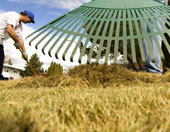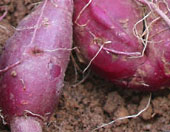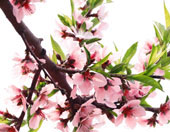
Tips for growing blueberries
Posted in Healthy Home & Garden on June 22, 2013. Last modified on April 21, 2019. Read disclaimer.
Blueberries are easy to grow if attention is paid to good soil preparation and correct planting. Although blueberries will produce fairly well in partial shade, they will produce the most berries in full sun.
Varieties: The type of blueberry that grows best in the mountains of Western North Carolina is Highbush, which can be found growing wild in the Northeastern US. (Rabbiteye varieties, which are more heat and drought resistant and tolerate a wider range of soil types, offer a second option to blueberry gardeners in the Piedmont and Coastal Areas of NC.)
Highbush blueberries require an especially low soil pH of 4.2 to 4.8 so soil testing before planting is particularly important. Highbush blueberries do not require cross-pollination, but may produce better if you have 2 or 3 varieties. This can also extend your harvest season since different varieties ripen at different times of the summer.
+ Free Shipping & Returns on Eligible Items.
(*Amazon's Top 100 list updated hourly.)
Planting: Blueberries do best when grown in full sun.
Do a soil test and correct pH and phosphate levels if needed. To lower pH one point (from 5.5 to 4.5), apply 2 1/2 cups of wettable sulfur (90% sulfur) to a 100 square foot area (10X10) and work in well. This should be done one year before planting. Improve drainage in clay soil by incorporating pine bark soil conditioner.
Bare root plants should be planted in late winter or early spring. Container grown plants can be planted in spring or fall. Space plants about 5 feet apart, being sure to loosen or slice the root ball and plant no deeper than the top of the ball. Apply 3 inches of pine bark or pine needle mulch and keep well watered.
You may want to consider the steps outlined in the University of Maine's Checklist for planting and caring for blueberries and their video series for How to grow blueberries.
Here's the hard part. All flowers should be removed for the first 2 years to allow the plants to put all their energy into root and plant growth, not berry production. Plants should be 4 feet tall before bearing fruit.
Maintenance: Blueberry roots are easily damaged by too much fertilizer. The first year apply about a tablespoon of azalea fertilizer after the leaves have come out. Repeat at 6 week intervals until July. Increase the fertilizer amount in successive years according to the size of the plant. An alternative fertilizer option is bloodmeal, applied at 1 pound for every 10 feet of row, in the spring, on top of the mulch.
Blueberry bushes are not very drought tolerant but they can also drown in chronically wet areas, so monitor soil moisture during the summer and irrigate if needed. Older plants should be pruned to maintain size and to remove some old canes or any diseased or damaged wood.
Though blueberries have few insect pests to worry about, you may want to net your plants to protect the fruit (before they begin to ripen) from birds.
Bearing age, average yield and life span of blueberries:
| Fruit | Type | Bearing Age | Avg. Annual Yield per Plant | Sugg. # of Plants for Family of 4 | Life Expectancy |
|---|---|---|---|---|---|
Blueberry |
Highbush |
3 years |
8 pounds |
6 |
20-30 years |
For more information see:
Bonemeal as fertilizer in the garden: http://seattletimes.com/html/homegarden/2013533787_gardenerwithin27.html
Growing Blueberries in the Home Garden at: http://www.ces.ncsu.edu/hil/hil-201.html
Primary source:
Back to Basics: Small Fruit for the Home Garden, Linda Blue, Agricultural Extension Agent, Buncombe County, NC
Your may also be interested in tips for growing: Blackberries and Raspberries | Blueberries | Grapes | Strawberries

 How to prepare if you have pets and are going to have a baby
How to prepare if you have pets and are going to have a baby Tips for battling afternoon fatigue
Tips for battling afternoon fatigue Organic Gardening infographic
Organic Gardening infographic Tools for determining your risk of disease
Tools for determining your risk of disease Getting a jumpstart on spring gardening
Getting a jumpstart on spring gardening Fall gardening tips and tricks
Fall gardening tips and tricks Composting kitchen and yard scraps
Composting kitchen and yard scraps How music and laughter can effect our health
How music and laughter can effect our health Simple to build, Do It Yourself standup desk
Simple to build, Do It Yourself standup desk Steps for keeping your eyesight healthy as you age
Steps for keeping your eyesight healthy as you age Guide to growing purple sweet potatoes
Guide to growing purple sweet potatoes What's radon in the home and why should I be concerned
What's radon in the home and why should I be concerned Simple and healthy smoothie recipes
Simple and healthy smoothie recipes What you can do to keep your Immune System strong
What you can do to keep your Immune System strong Gardener's guide to growing strawberries
Gardener's guide to growing strawberries Causes of stress and how to deal with it
Causes of stress and how to deal with it Poisonous plants in your home and garden
Poisonous plants in your home and garden